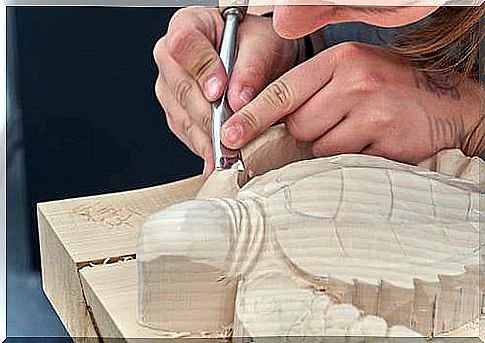Working With Your Hands Is Good For Your Brain

Working with your hands is a way to improve your mental health.
Modeling with clay, knitting, shaping, sculpting, sewing, gardening and painting, among other activities, are wonderful ways to stimulate your brain.
They are also a great way to relieve stress, improve neuroplasticity and work on your skills, your concentration and your composure.
The connection between hand and brain is a crucial alliance for humans. It creates a positive feedback loop that can really help you grow.
This is something we have seen for decades, both in anthropology and psychology. That is why it is so important for children to learn to develop their abilities with their hands and to work with fine motor skills.
Because it’s good for their brains!
But we all know that when we grow up and do not have much time, we forget the great thing about these manual activities. If it’s not part of your job, you probably are not.
In fact, things like phones and computers have made people write by hand less and less.
It is true that many people know the benefits of exercise, but most do not think that this also applies when it comes to their hands. The hands are extremely versatile and mobile and have lots of creative potential.
Using your hands actively for all kinds of manual tasks can also improve your mood. Let’s further explore what this is really about.

Creativity and mental health
It is probably not an exaggeration to say that we have reached a point in our society where manual labor is losing its value.
Office jobs, think tanks, marketing, advertising, engineering, finance, technology companies and so on. All of these are career opportunities that prioritize other types of skills.
In all these areas, it is mainly about intellectual skills.
But there are also important professions such as construction workers, agricultural workers, car mechanics, plumbers or electricians that require a pair of skilled hands.
To solve problems for the rest of us and ensure that we always have a good quality of life. What we are trying to come up with is that both intellectual and manual jobs are important in our daily lives.
It is also worth pointing out that a very interesting perspective on this is beginning to take shape in neuropsychology. We need to get rid of the recent trend of highlighting intellectual work over manual work.
In fact, if we completely abolish manual tasks in our daily lives, it goes against our own nature.
It can also be extremely good for you. Neuroscientist Dr. Kelly Lambert from the University of Richmond says that manual tasks can even reduce the risk of depression.
Working with your hands and mental health
The ability to create tools is what made us humans what we are today. That cooperation between eye, hand and brain is a perfect intellectual and emotional “constellation” that can provide many benefits.
So why do we neglect this important part of our lives?
- Sitting in front of your computer all day does not count as working with your hands. Taking the drain does not count either. We are talking about something that is much deeper than that, something that requires you to use your neural connections and increase your neuroplasticity.
- How do you do it? Through creation and transformation. You should engage in some form of process that has a satisfactory end result. Everything from sculpting, modeling clay, knitting, drawing or just planting a flower can have a big, positive impact on your emotional life.
Dr. Kelly Lambert says the same basic thing in her book, Lifting Depression: A Neuroscientist’s Hands-On Approach to Activating Your Brain’s Healing Power .
The goal is to find manual tasks that activate the brain’s reward centers through cognitive effort, concentration and the pleasure you get from the task.

Effort, creation and satisfaction: neurochemistry that fights depression
Just to be clear: simply learning to model clay, sculpt or knit will not make your depression go away.
Working with your hands is simply a catalyst, a way to change your brain chemistry. It is a starting point to get you to a better state.
Combined with other things like therapy, it can have some really amazing effects. But let’s take a closer look at exactly what benefits it has for your brain to work with your hands:
- It changes the physiology and chemical responses of your brain. Doing manual tasks releases serotonin and endorphins, and it reduces your levels of cortisol – the “stress hormone”.
- Manual data can also improve your neuroplasticity by creating new pathways between neurons. It helps you keep your brain young and healthy longer.
- As Dr. Robin Hurley of Baylor University explained that manual tasks that are important to patients (such as playing instruments, painting, etc.) can even help manage the effects of chronic stress. This is important because it means they become more receptive and relaxed when confronted with their depression.
The key is to awaken your passion
Finally, we want to clarify another point. Not all manual tasks are beneficial. For example, if you work in a factory, the repetitive activities you do do not confer any benefits.
The key is to find something that arouses your curiosity, your passion and your interest. Find a manual task that satisfies you, drives you and also helps you relax.
Try to find the “flow”, or “flow”, that the psychologist Mihaly Csikszentmihalyi has talked so much about. The state where the world stops and you are completely in tune with yourself, fully involved in the creative process.
Few things are as satisfying as that.









